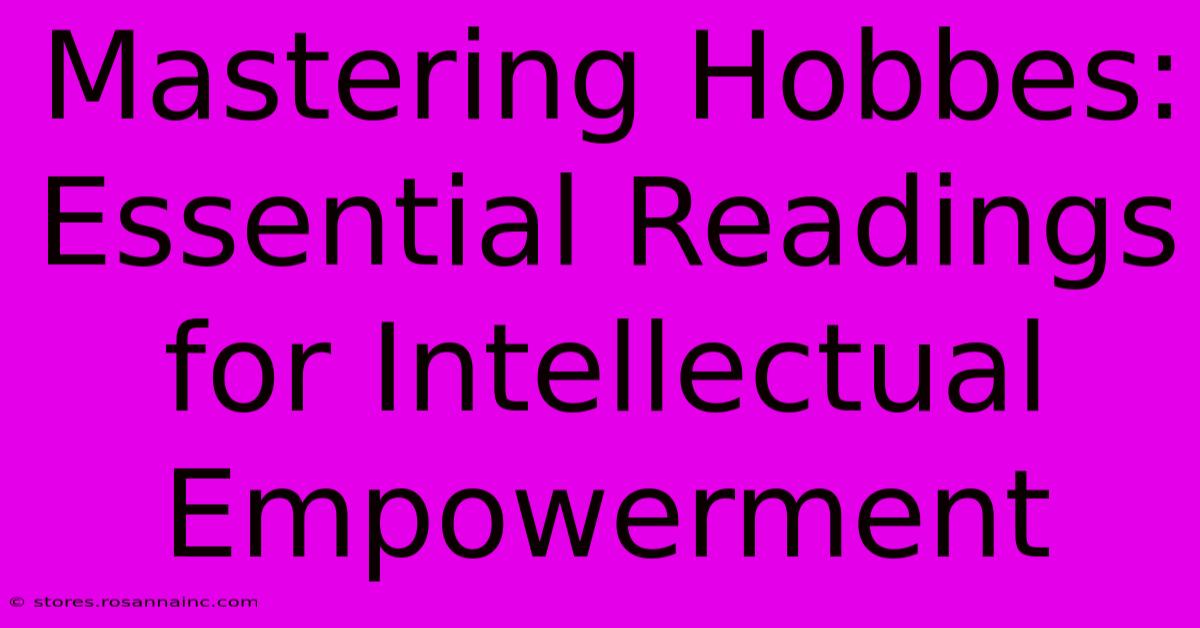Mastering Hobbes: Essential Readings For Intellectual Empowerment

Table of Contents
Mastering Hobbes: Essential Readings for Intellectual Empowerment
Thomas Hobbes, a towering figure of 17th-century philosophy, continues to resonate with contemporary readers. His groundbreaking work, Leviathan, tackles fundamental questions about human nature, society, and the state, offering insights that remain remarkably relevant today. This article explores essential readings to truly grasp Hobbes's intellectual contributions and unlock your own intellectual empowerment. Understanding Hobbes isn't just about historical context; it's about equipping yourself with tools to navigate complex political and social landscapes.
Delving into Leviathan: The Cornerstone of Hobbesian Thought
Leviathan itself is the undisputed starting point. This monumental work, published in 1651, lays out Hobbes's political philosophy with breathtaking clarity and rigor. It's not a light read, but engaging with its core arguments – the state of nature, the social contract, and the absolute sovereignty of the Leviathan – is crucial for understanding his broader project. Pay close attention to:
- The State of Nature: Hobbes's depiction of life without government as a "war of all against all" is famously brutal. Understanding his reasoning behind this bleak portrayal is essential.
- The Social Contract: How do individuals escape this chaotic state? Hobbes's answer, the social contract, is a cornerstone of political theory. Examine his arguments for surrendering individual rights to an absolute sovereign.
- The Sovereign's Power: Hobbes advocates for a powerful, even absolute, sovereign to maintain order. Analyze the implications of this for individual liberty and the potential for tyranny.
Beyond Leviathan: Expanding Your Hobbesian Understanding
While Leviathan is paramount, exploring other works enriches your understanding significantly. These complementary readings illuminate different facets of Hobbes's thought and provide crucial context:
- Elements of Law, Natural and Politic (1640): This earlier work provides a foundation for Leviathan, outlining Hobbes's views on natural law and the beginnings of his political philosophy. It reveals the development of his ideas before their mature articulation in Leviathan.
- De Cive (1642): A shorter and arguably more accessible work than Leviathan, De Cive (On Citizen) lays out Hobbes's political theory in a more concise manner. It serves as a helpful stepping stone to the larger work.
- Human Nature: Understanding Hobbes's conception of human nature is vital. His view of humans as fundamentally self-interested beings drives his entire philosophical system. Look for secondary sources that analyze this aspect specifically.
Engaging with Secondary Sources: Gaining Deeper Insights
Don't limit yourself solely to Hobbes's primary works. Secondary sources offer valuable context, critique, and different perspectives. Look for scholarly works that:
- Analyze Hobbes's influence: Trace the impact of Hobbesian thought on subsequent thinkers and political movements.
- Critique Hobbes's arguments: Engage with criticisms of Hobbes's philosophy, considering alternative perspectives.
- Place Hobbes within his historical context: Understand the intellectual and political climate that shaped his thinking.
Mastering Hobbes: A Journey of Intellectual Growth
Mastering Hobbes is not a sprint, but a marathon of intellectual engagement. By carefully studying his primary works and supplementing them with secondary scholarship, you'll gain a deeper understanding of his enduring legacy and equip yourself with powerful tools for analyzing the complexities of power, society, and human nature. The journey itself is a testament to intellectual empowerment, fostering critical thinking and providing a framework for navigating the challenges of our own time. Embarking on this intellectual adventure will undoubtedly enhance your capacity for reasoned discourse and informed engagement with the world around you.

Thank you for visiting our website wich cover about Mastering Hobbes: Essential Readings For Intellectual Empowerment. We hope the information provided has been useful to you. Feel free to contact us if you have any questions or need further assistance. See you next time and dont miss to bookmark.
Featured Posts
-
Al Capones Laundering This Book Isnt What You Think
Feb 10, 2025
-
Hurts 2000 Rental 255 M Contract
Feb 10, 2025
-
70 Mm In Inches Your Conversion Questions Answered
Feb 10, 2025
-
Craving Time Travel Dive Into This Ruby Red Trilogy Summary
Feb 10, 2025
-
Love Island All Stars Who Found Lasting Love
Feb 10, 2025
